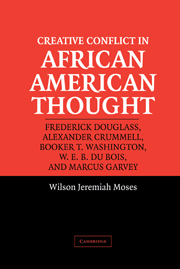Book contents
- Frontmatter
- Contents
- Acknowledgments
- Preface: Struggle, Challenge, and History
- 1 Introduction: Reality and Contradiction
- FREDERICK DOUGLASS: THE INDIVIDUALIST AS RACE MAN
- ALEXANDER CRUMMELL: THE ANGLOPHILE AS AFROCENTRIST
- BOOKER TALIAFERO WASHINGTON: THE IDEALIST AS MATERIALIST
- W. E. B. DU BOIS: THE DEMOCRAT AS AUTHORITARIAN
- MARCUS MOZIAH GARVEY: THE REALIST AS ROMANTIC
- 13 The Birth of Tragedy: Garvey's Heroic Struggles
- 14 Becoming History: Garvey and the Genius of His Age
- CONCLUSION: RESCUING HEROES FROM THEIR ADMIRERS
- Index
14 - Becoming History: Garvey and the Genius of His Age
Published online by Cambridge University Press: 07 November 2009
- Frontmatter
- Contents
- Acknowledgments
- Preface: Struggle, Challenge, and History
- 1 Introduction: Reality and Contradiction
- FREDERICK DOUGLASS: THE INDIVIDUALIST AS RACE MAN
- ALEXANDER CRUMMELL: THE ANGLOPHILE AS AFROCENTRIST
- BOOKER TALIAFERO WASHINGTON: THE IDEALIST AS MATERIALIST
- W. E. B. DU BOIS: THE DEMOCRAT AS AUTHORITARIAN
- MARCUS MOZIAH GARVEY: THE REALIST AS ROMANTIC
- 13 The Birth of Tragedy: Garvey's Heroic Struggles
- 14 Becoming History: Garvey and the Genius of His Age
- CONCLUSION: RESCUING HEROES FROM THEIR ADMIRERS
- Index
Summary
The Lords of life, the lords of life, –
I saw them pass,
In their own guise
Like and unlike,
Portly and grim …
EmersonREPRESENTATIVE GENIUS, DETERMINISM, AND DOOM
Words, as we know, may sometimes gain or sometimes lose powers with the passage of time. The word “genius” is an example, or the word “portly,” as used above. When Benjamin Brawley wrote The Negro Genius (1937), he meant something more generous than what is implied by its more confined meaning of superior artistic or intellectual ability. He was thinking of its older usage, which is related to “genus” and denotes the distinguishing characteristics of a racial or ethnic group. It was common to speak of the genius of a nation or the genius of an age, which connoted the commonalities of a group, not necessarily the superiority of an individual. Emerson was able to employ both meanings of the word “genius” in “Self Reliance” (1841) and a third in “Experience” (1844). A good writer seeks to exploit a word's multiple meanings, which may disappear in the vulgate, which sometimes reduces a word to a single colloquial meaning.
Likewise, the word “portly,” in the Emerson quotation above, has been reduced to the insipid, one-dimensional meaning of “fat.” In the Renaissance poetry of Edmund Spenser, “portly” suggests a perhaps excessive dignity. It is related to “comportment,” implying gravity to the point of hubris, or the pride that “goeth before the fall.”
- Type
- Chapter
- Information
- Creative Conflict in African American Thought , pp. 256 - 284Publisher: Cambridge University PressPrint publication year: 2004



